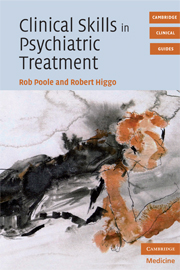Book contents
- Frontmatter
- Contents
- Acknowledgments
- Author biographies
- Introduction
- PART I UNDERLYING PRINCIPLES
- PART II THE CONTEXT AND LOCATION OF TREATMENT
- PART III PROBLEMS IN TREATMENT
- PART IV COPING
- 17 Coping with dilemmas
- 18 Coping with change
- Afterword: Optimism of the will and pessimism of the intellect
- References
- Index
18 - Coping with change
from PART IV - COPING
Published online by Cambridge University Press: 08 August 2009
- Frontmatter
- Contents
- Acknowledgments
- Author biographies
- Introduction
- PART I UNDERLYING PRINCIPLES
- PART II THE CONTEXT AND LOCATION OF TREATMENT
- PART III PROBLEMS IN TREATMENT
- PART IV COPING
- 17 Coping with dilemmas
- 18 Coping with change
- Afterword: Optimism of the will and pessimism of the intellect
- References
- Index
Summary
No one can expect to avoid the transition from young, promising and open-minded specialist to reactionary, outdated and oppositional senior professional. These changes happen slowly and it seems inevitable that you will be the last to notice what has happened. It may be a little paranoid for us to worry that in private our trainees say ‘Apparently he was regarded as a skilled and progressive clinician when he was young!’ whilst others shake their heads in amazement. However, we cannot be the only aging psychiatrists with concerns that we might be past our best. The neurotic worries of late middle age lack an intuitive salience early in one's career. However, you are set on the route to dysfunctionality and unhappiness long before the relevance of learning to cope with change becomes obvious. It may be wise to think about some of the issues early on.
One of the marked features of being young is that the years appear to pass slowly. The world seems stable, and change is gradual. Although middle age is a much longer phase of life, its years pass with alarming speed, which creates an unmistakable sense that one is hurtling towards old age, infirmity and death. As you get older, the world seems to change at an accelerating pace, and few certainties remain. There are a number of explanatory theories about this universal phenomenon of the perception of accelerating time.
- Type
- Chapter
- Information
- Clinical Skills in Psychiatric Treatment , pp. 203 - 212Publisher: Cambridge University PressPrint publication year: 2008



